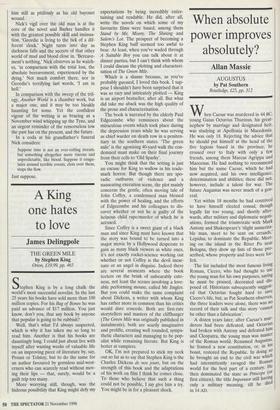A King one hates to love
James Delingpole
THE GREEN MILE by Stephen King Orion, f10.99, pp. 465 tephen King is by a long chalk the world's most successful novelist. In the last 25 years his books have sold more than 100 million copies. For his Bag of Bones he was paid an advance of $17 million. You just know, don't you, that any book by anyone that popular is going to be rubbish?
Well, that's what I'd always suspected, which is why it has taken me so long to read him. Another is that his books are dauntingly long. I could just about live with myself after wasting weeks of valuable life on an improving piece of literature by, say, Proust or Tolstoy, but to do the same for an author favoured by gormless mid-west- erners who can scarcely read without mov- ing their lips — that, surely, would be a guilt trip too many.
More worrying still, though, was the hideous possibility that King might defy my expectations by being incredibly enter- taining and readable. He did, after all, write the novels on which some of my favourite films were based, among them Stand by Me, Misery, The Shining and Salem's Lot. The prospect of becoming a Stephen King buff seemed too awful to bear. At least, when you've waded through A Suitable Boy you can talk about it at dinner parties, but I can't think with whom I could discuss the plotting and characteri- sation of The Green Mile.
Which is a shame because, as you've probably guessed, I loved this book. I sup- pose I shouldn't have been surprised that it was so racy and intricately plotted — King is an airport bestseller, after all. But what did take me aback was the high quality of the prose and characterisation.
The book is narrated by the elderly Paul Edgecombe who reminisces about the miraculous events which took place during the depression years while he was serving as chief warder on death row in a peniten- tiary in the southern states. 'The green mile' is the agonising 40-yard walk the con- demned must make on their final journey from their cells to 'Old Sparky'.
You might think that the setting is just an excuse for King to wallow in his trade- mark horror. But though there are spo- radic outbursts of violence and a nauseating execution scene, the plot mainly concerns the gentle, often moving tale of John Coffey, a condemned man blessed with the power of healing, and the efforts of Edgecombe and his colleagues to dis- cover whether or not he is guilty of the heinous child rape/murder of which he is accused.
Since Coffey is a sweet giant of a black man and since King must have known that the story was bound to be turned into a major movie by a Hollywood desperate to gain as many black viewers as white ones, it's not exactly rocket-science working out whether or not Coffey is the devil incar- nate or an angel in disguise. Indeed there are several moments where the book teeters on the brink of unbearably cute- ness, not least the scenes involving a love- able performing mouse, called Mr Jingles. But you could make the same complaint about Dickens, a writer with whom King has rather more in common than his critics would dare concede. Both are first-rate storytellers and masters of the cliffhanger (The Green Mile was originally published in instalments), both are scarily imaginative and prolific, creating well rounded, sympa- thetic characters and managing to be pop- ulist while remaining literate. But King is better at vampires.
OK, I'm not prepared to stick my neck out so far as to say that Stephen King is the Charles Dickens de nos fours, but on the strength of this book and the adaptations of his work on film I think he comes close. To those who believe that such a thing could not be possible, I say give him a try. You might be in for a pleasant shock.


















































































 Previous page
Previous page